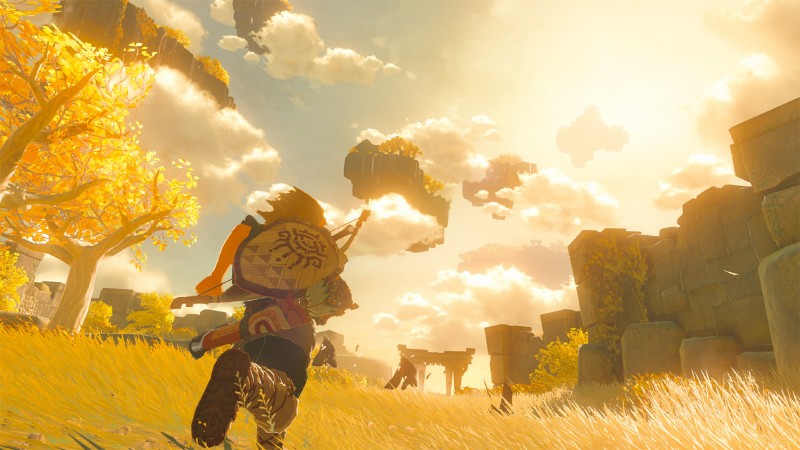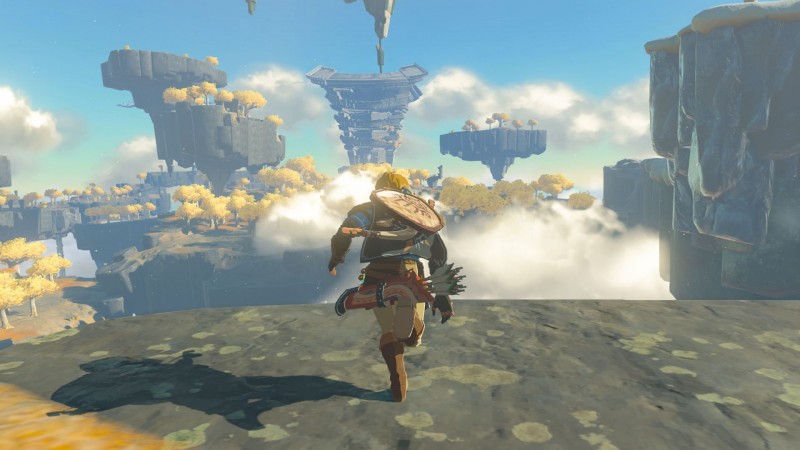
When The Legend of Zelda: Tears of the Kingdom launched in May, it immediately became a cultural phenomenon. In addition to spawning countless viral social media posts about the creations of players, it also quickly became the fastest-selling Legend of Zelda title, as well one of the frontrunners for 2023's Game of the Year award. At the time of its launch, producer Eiji Aonuma and director Hidemaro Fujibayashi didn't know what the community reaction would eventually become.
However, now more than a half year removed from the launch of Tears of the Kingdom, I once again caught up with Aonuma and Fujibayashi to break down some of the more discussed moments of Tears of the Kingdom and speak about the evolution of the series. You can read the full interview below.
Just be warned that there are sporadic spoilers for The Legend of Zelda: Tears of the Kingdom in the interview below.
Now that it's been just over half a year since The Legend of Zelda: Tears of the Kingdom was released, how are you feeling about the reception of the game to this point?
Eiji Aonuma: Thinking about my past of making games, with past titles in the series, it always seemed to me that there was great excitement when the game would come out among the community, but then that would kind of die off relatively quickly. And then, we kind of saw a new trend with Breath of the Wild where the game was released, and we were really pleased to see that it maintained this interest among the fans and they continued voicing their opinions and sharing discussions online. We've been happy to see this continue with Tears of the Kingdom as well. I'm so pleased to see that people are still putting up these unbelievable vehicles and different creations they've been making online. I'm just happy to see that's still continuing.
And another thing that I haven't really experienced myself from the development side, looking at the reception once a game has come out, is I've seen many people saying that they don't want to go to the ending of the game because they don't want it to end. And so they've been putting off clearing the game, and that's something I haven't experienced before.
Hidemaro Fujibayashi: From my side, obviously, in past titles, the core gaming audience expressed their joy and satisfaction and fun playing other Zelda titles. But starting with Tears of the Kingdom, I see now a wider audience being able to enjoy this game. People who are maybe older or maybe a lot younger. You know, kids that are around my youngest kid's age. Obviously, it's with Breath of the Wild as well, but we built this game to be able to be enjoyed by a wider audience. And to see that come to fruition and to see that really gives me the realization that we were able to accomplish that goal.
Tears of the Kingdom plays off Breath of the Wild, but the addition of Ultrahand adds so much to the core experience. It now feels so integral to the experience and so important to those more casual fans that you mentioned bringing in. With that in mind, do you think we will see Ultrahand return in future titles?
HF: When we're creating a title, say, Tears of the Kingdom, as you mentioned, the crux of the experience in playing Tears of the Kingdom is Ultrahand and the freedom to create. As you mentioned, that is what Tears of the Kingdom is. So every time we're making a Zelda title, we want to create something new. If, for example, there was any continuation of Tears of the Kingdom and we were to bring in, say, Ultrahand, then I think to us, it would feel like, "Well, we're just bringing in Tears of the Kingdom as is." What we want to do from a game creator's perspective is create something new. From that perspective, I don't think we'll be seeing Ultrahand in every Zelda game or anything in the future.
EA: When you're talking about Ultrahand, that is a really core idea for Tears of the Kingdom and I think it represents our approach of kind of putting everything we could into this game. You know, first putting all of our ideas in and then being very selective about what we wanted to remain, removing all of the parts that didn't make sense or didn't fit perfectly. This game, then, is the result of that selection process. This time, you'll see that there is no DLC because of that process. We created what we wanted to create and felt that it was complete in that fashion. So from that aspect as well, I think we definitely won't be including Ultrahand in titles going forward.

In that same notion where you did, earlier this year, confirm that there won't be any DLC for Tears of the Kingdom because you've already accomplished everything you want to accomplish with this game – have you ruled out another direct sequel?
EA: [Laughs] Well that would be a sequel to a sequel, which is getting a little bit wild when you think about it! But as I've mentioned previously, with Tears of the Kingdom, we were seeking to build on top of the world we created with Breath of the Wild and really exhaust the possibilities of what we could put into that world. I think it is – to use a bit of a term – an apotheosis, or the final form of that version of The Legend of Zelda. In that regard, I don't think that we'll be making a direct sequel to a world such as that that we've created.
One thing I really loved during Tears of the Kingdom's final battle sequence is when Ganondorf powers up and the health bar extends to go off the screen. It was a really great way to subvert expectations of the player. Where did that idea come from and why did the team decide to implement it into that battle?
HF: At the core of what you mentioned is really the DNA of Nintendo. If we want to express the power level or ability of something visually, how can we do that? For example, if you look at a turtle shell and it has spikes, you intuitively know that you can't step on it. It's that same concept; we wanted to express how much of a level-up or power-up Ganondorf is experiencing, and we thought about how can we express that visually. How can we do it in a way that again subverts expectations and gets a reaction like you had? The result was, "Why don't we just have the health meter go off the screen?" That's very intuitive and conveys the fact that this enemy is very, very strong.
Normally, other companies would probably just put another layer of a different color over the pre-existing health bar instead of what you did.
EA: I think we always have the desire to try something different and to go a different direction with things like that. We also want to make things that look cool and, as we previously said, give you that impression of, "Wait, what's going on here?! What is this?" We always want to do something a little bit that will make you kind of laugh a little bit, like, "What am I seeing right now?"
HF: We usually take the diagonal approach, not the straightforward approach. [Laughs]

When you're developing a new Zelda title, obviously your primary focus is on core gameplay, but the timeline placement discussion has become more important and prevalent among the fans of the series. How much consideration and importance does the development team put into those discussions?
HF: As you mentioned, we realized that fans have a great time theorizing and enjoy thinking about where things fit on the timeline. That's something that the development team recognizes and it considers, but to an extent. And I say, "to an extent" because if we get too into the weeds or too detailed in that placement, it results in kind of creating restraints for our creativity; the process of creating new ideas becomes restricted because we're so tied up and trying to make this fit into a very specific spot in the timeline. We do consider it, but not to an extent where we feel that our development process feels restricted or constrained.
